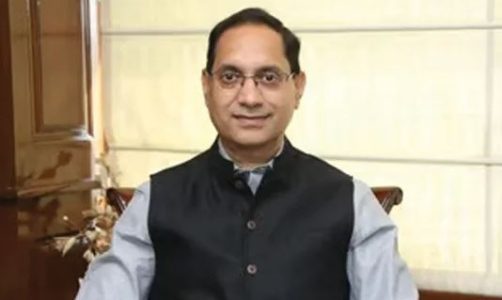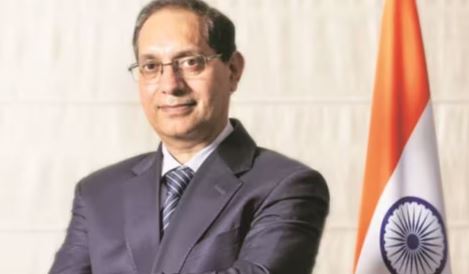The Finance Secretary of India is one of the most significant figures in the country’s economic administration, influencing critical policies that shape the nation’s fiscal health. Many people often wonder about the roles, responsibilities, and significance of this high-ranking official.
What makes the Finance Secretary such a pivotal position in the Indian government? How are they appointed, and what impact do they have on the country’s financial landscape?
In this article, we will explore everything you need to know about the Finance Secretary of India. From their responsibilities to their role in the Union Budget and fiscal policy, we’ll also discuss the current Finance Secretary and how this role has evolved over the years.
Who Is the Finance Secretary of India?

Image – Source
The Finance Secretary of India is the senior-most officer in the Indian civil services, specifically from the Indian Administrative Service (IAS) cadre, and acts as the head of the Department of Economic Affairs (DEA) within the Ministry of Finance.
This position plays a pivotal role in shaping India’s economic policies, managing public finances, and ensuring the smooth functioning of the country’s financial ecosystem.
As of January 2025, Tuhin Kanta Pandey holds the esteemed position of Finance Secretary. He succeeded previous officeholders with a reputation for handling complex economic challenges and implementing reforms that benefit the nation’s fiscal health.
The Finance Secretary is one of the most influential figures in the government, coordinating with various departments under the Ministry of Finance, such as Revenue, Expenditure, and Financial Services.
Their leadership is crucial during the preparation of the Union Budget, where major economic and fiscal policies are discussed and finalized.
What Are the Roles and Responsibilities of the Finance Secretary in India?
The Finance Secretary is entrusted with a wide range of responsibilities aimed at ensuring the economic stability and financial well-being of the country. Some of the core roles include:
- Overseeing the formulation and implementation of India’s fiscal policies.
- Supervising the preparation of the Union Budget, including revenue and expenditure forecasting.
- Leading discussions with international organizations such as the International Monetary Fund (IMF) and the World Bank.
- Monitoring the country’s macroeconomic performance, including GDP growth, inflation, and fiscal deficit.
- Coordinating with other departments in the Ministry of Finance for seamless policy execution.
In addition to these, the Finance Secretary also provides advice to the government on public finance management, debt management, and tax reforms.
Their role is indispensable when it comes to crafting policies that encourage investments and sustainable economic growth.
How Is the Finance Secretary Appointed in India?

The appointment of the Finance Secretary is a meticulous process. The role is filled by a senior IAS officer, typically from the 1987 or earlier IAS batch, who has extensive experience in handling economic matters and government administration.
The process involves the following steps:
- The Appointments Committee of the Cabinet (ACC), chaired by the Prime Minister of India, selects the Finance Secretary.
- The IAS officer must have previously served in a key economic or financial role, such as Secretary of Economic Affairs, Secretary of Expenditure, or Secretary of Financial Services.
- Recommendations are made based on the officer’s performance, achievements, and expertise in economic matters.
The tenure of the Finance Secretary is not fixed and often depends on the government’s discretion. However, it is common for Finance Secretaries to serve until their retirement or as per the requirements of the government.
Who Is Tuhin Kanta Pandey, the Current Finance Secretary of India?
Tuhin Kanta Pandey, an IAS officer of the 1987 Odisha cadre, is the current Finance Secretary of India. He was appointed to this position owing to his exemplary track record in public administration and financial policymaking.
Before assuming this role, Pandey served as the Secretary of the Department of Investment and Public Asset Management (DIPAM). During his tenure at DIPAM, he played a crucial role in spearheading strategic disinvestment initiatives, including the privatization of prominent Public Sector Enterprises (PSEs).
Here are some of his notable achievements:
- Successfully managed the privatization of Air India, marking a significant milestone in India’s disinvestment agenda.
- Played a key role in creating frameworks for improving public sector efficiency.
- Contributed to drafting India’s fiscal strategy in alignment with sustainable economic goals.
Tuhin Kanta Pandey’s wealth of experience and visionary approach to financial governance make him a critical figure in the country’s economic landscape.
What Is the Career Journey of Tuhin Kanta Pandey?

Image – Source
Tuhin Kanta Pandey’s professional career spans decades of impactful contributions to India’s financial and administrative systems. Here is a snapshot of his career trajectory:
- IAS Induction (1987): Joined the Odisha cadre and began his journey in public administration.
- State-Level Roles: Held various positions in Odisha, including district collector, where he focused on regional economic development.
- Central Government Assignments: Served in critical roles at the centre, including his tenure as the Secretary of DIPAM.
- Disinvestment Leadership: Championed the privatization of several PSEs, bringing efficiency to India’s public sector.
His expertise in balancing economic reforms with administrative efficiency underscores his contributions to India’s financial sector.
How Does the Finance Secretary Contribute to India’s Fiscal Policies?
The Finance Secretary is the chief architect of India’s fiscal policies, ensuring the nation’s economic growth and stability through a mix of planning, monitoring, and implementation. Here’s a more detailed look at their contributions:
- Drafting the Fiscal Responsibility and Budget Management (FRBM) Act guidelines: Ensures accountability in fiscal operations and sets limits on the fiscal deficit to promote long-term stability.
- Monitoring the nation’s fiscal deficit: Constantly reviews economic indicators to suggest corrective measures if the deficit exceeds sustainable levels.
- Streamlining government expenditure: Advocates for efficient spending on infrastructure, healthcare, and education to stimulate economic growth without exceeding budget constraints.
- Overseeing public debt management: Proposes innovative methods like issuing sovereign green bonds to diversify debt instruments and reduce reliance on high-cost borrowing.
- Tax Reforms and Revenue Mobilization: The Finance Secretary plays a key role in revising indirect and direct taxation policies to broaden the tax base and improve compliance.
Additionally, during periods of global economic volatility, the Finance Secretary works closely with monetary authorities like the Reserve Bank of India (RBI) to stabilize the economy, ensure liquidity, and protect investor confidence.
What Is the Relationship Between the Finance Secretary and the Union Budget?

The Finance Secretary is at the helm of preparing and presenting the Union Budget of India, which is the government’s annual financial statement. This comprehensive process involves:
- Forecasting the country’s income: Includes identifying revenue sources like direct taxes (income tax, corporate tax) and indirect taxes (GST), as well as capital receipts from disinvestment and borrowings.
- Allocating funds to ministries and sectors: Balances resources across critical sectors such as defense, rural development, healthcare, and education while ensuring efficient utilization.
- Prioritizing sustainable development goals (SDGs): Ensures that the budget promotes green energy, digital transformation, and inclusive growth.
- Managing subsidies and welfare schemes: The Finance Secretary evaluates the fiscal burden of subsidies (such as food, fertilizer, and fuel) and welfare schemes, suggesting rationalizations where necessary.
- Policy announcements: Ensures that the budget includes economic reforms such as incentives for manufacturing (PLI schemes) and digitization of governance.
The Finance Secretary also acts as the face of budgetary discussions, addressing media and providing clarity to stakeholders about the government’s economic vision.
How Does the Finance Secretary Coordinate with Other Departments of the Finance Ministry?
The Ministry of Finance is divided into key departments, and the Finance Secretary ensures a seamless connection between them. Here’s a more detailed explanation of their coordination responsibilities:
- Department of Economic Affairs (DEA): Focuses on macroeconomic policies, capital markets, and external commercial borrowings. The Finance Secretary ensures these policies are aligned with national priorities.
- Department of Revenue (DoR): Manages tax laws, GST implementation, and revenue collection. The Finance Secretary provides input to streamline tax compliance and improve collection efficiency.
- Department of Financial Services (DFS): Looks after banking, insurance, and pension reforms. The Finance Secretary ensures that DFS policies improve financial inclusion and accessibility.
- Department of Expenditure: Monitors government expenditure and audits fiscal resources. The Finance Secretary enforces discipline in spending while balancing development goals.
Additionally, the Finance Secretary coordinates:
- Inter-ministerial collaborations: Ensures financial policies are implemented smoothly across other ministries like Commerce, Industry, and Energy.
- Crisis management: Leads discussions during economic emergencies, ensuring swift and unified action across all finance-related departments.
- Stakeholder Engagement: Works with public sector banks, financial institutions, and private organizations to address systemic challenges.
What Are the Major Challenges Faced by a Finance Secretary in India?

The Finance Secretary’s position comes with a wide range of challenges, given the complex and ever-changing nature of India’s economy. Below are additional points to provide a more comprehensive view:
- Balancing Public Spending and Revenue Generation: The Finance Secretary must meet increasing demands for infrastructure development, social welfare, and subsidies while managing fiscal constraints.
- Global Economic Uncertainties: Events like the COVID-19 pandemic, geopolitical conflicts, and trade disruptions pose significant risks to India’s growth trajectory.
- Attracting Foreign Direct Investment (FDI): Competing with other countries to make India a preferred investment destination by simplifying regulations and improving ease of doing business.
- Handling Inflationary Pressures: The Finance Secretary must address rising inflation while ensuring that growth does not slow down, often requiring coordinated fiscal and monetary measures.
- Implementing Tax Reforms: Ensures that tax policies are business-friendly yet generate adequate revenue. Recent challenges include optimizing GST and reducing tax evasion.
- Digital Transformation of Public Finances: Integrating advanced technologies like Artificial Intelligence (AI) and blockchain to enhance transparency and efficiency in governance.
- Balancing Federal Interests: Works with state governments to allocate funds equitably while maintaining national fiscal priorities.
These challenges make the Finance Secretary’s role both demanding and crucial for India’s economic stability.
How Has the Role of Finance Secretary Evolved Over the Years?
The Finance Secretary’s role has undergone significant evolution as India’s economy has transformed over the decades. Additional points to elaborate further include:
- Economic Liberalization (1991): The Finance Secretary played a crucial role in initiating reforms such as reducing trade barriers, privatizing state-owned enterprises, and attracting foreign investments.
- Digital Governance Initiatives: In recent years, Finance Secretaries have led initiatives such as GST implementation, Direct Benefit Transfer (DBT) schemes, and e-invoicing systems to reduce corruption and enhance efficiency.
- Climate Finance Leadership: With global commitments like the Paris Agreement, the Finance Secretary has become instrumental in allocating funds for renewable energy projects and sustainability programs.
- Strengthening India’s Global Financial Standing: As India emerges as a key global player, the Finance Secretary represents the country in global economic forums like the G20, IMF, and BRICS.
- Boosting Startups and MSMEs: The Finance Secretary now emphasizes promoting innovation and entrepreneurship through financial incentives and credit access programs.
This evolution reflects the Finance Secretary’s growing influence as a policymaker who not only handles finances but also shapes India’s economic trajectory.
Conclusion
The Finance Secretary of India plays a critical role in steering the country’s financial and economic policies, ensuring fiscal discipline, and contributing to sustainable growth.
From crafting the Union Budget to managing the fiscal deficit, the Finance Secretary’s responsibilities impact nearly every aspect of India’s economy.
In this article, we explored the position’s significance, the appointment process, the contribution of the current Finance Secretary, Tuhin Kanta Pandey, and the challenges faced in this role.
As the nation continues to evolve economically, the Finance Secretary remains at the heart of strategic policymaking and financial governance, driving India toward greater economic resilience and global prominence.
FAQs
What is the qualification required to become Finance Secretary of India?
The Finance Secretary is an IAS officer with a background in economics, finance, or public administration.
How does the Finance Secretary differ from the Finance Minister?
The Finance Minister is a political leader, whereas the Finance Secretary is an administrative officer who implements policies.
Who was the first Finance Secretary of India?
The first Finance Secretary was Shanmukham Chetty, who also presented India’s first Union Budget.
How does the Finance Secretary influence the economy?
They design fiscal policies, manage budgets, and provide economic guidance to the government.
What is the tenure of the Finance Secretary?
There is no fixed tenure; it depends on government discretion.
Which ministry does the Finance Secretary report to?
The Finance Secretary reports to the Ministry of Finance.
What is the importance of the Union Budget in India?
The Union Budget allocates resources and outlines government priorities for economic growth.
Featured Image – Source




